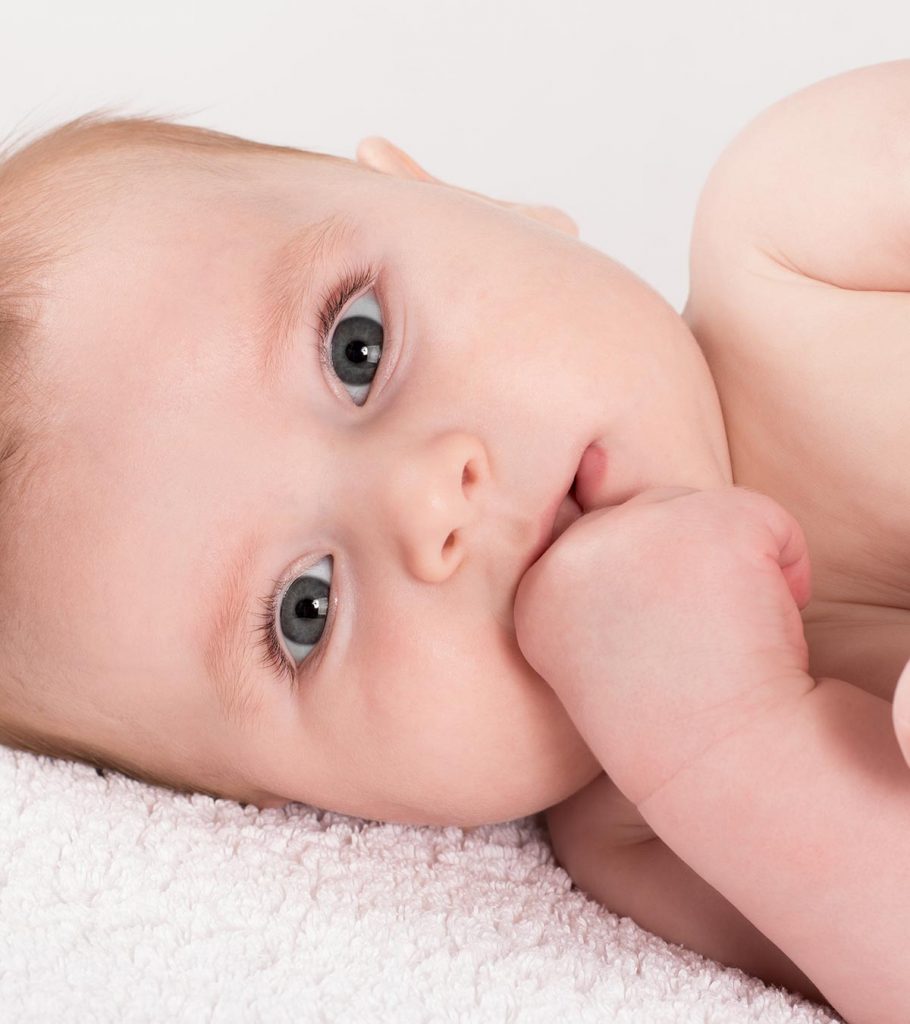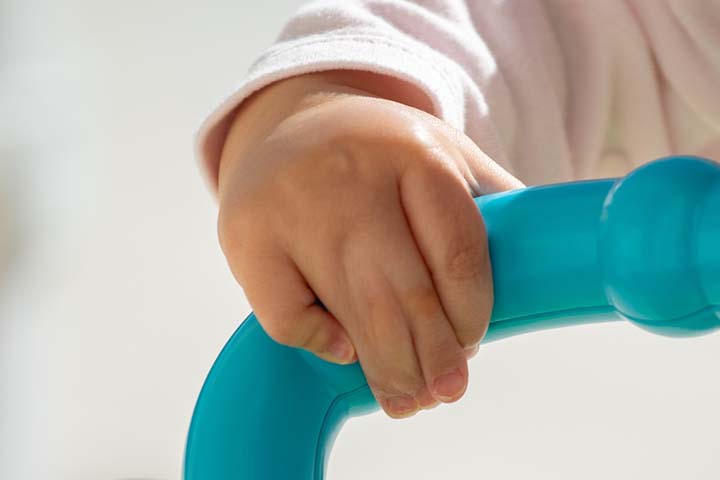Babies suck their hands to communicate and self-soothe. A baby sucking hand is considered a normal part of their development and may begin at two months. Besides sucking hands, you may notice babies sucking fists or even trying to put their feet in their mouths.
Most babies stop sucking their hands by themselves at around two to four years. However, if a child sucks their hands even in their kindergarten years, consult a pediatrician because hand sucking could interfere with secondary or permanent teething.
Keep reading to know why babies suck their hands, its risks, and effective ways to help babies outgrow it.
Reasons For Hand Sucking In Babies
Various reasons may make a baby suck their hands. You may have to observe your baby in detail to identify the cause of hand sucking.
Common reasons may include (1):
1. Hunger
Babies may suck hands when they are hungry. Hand sucking may indicate feeding time. Since babies suck a nipple to get milk or formula, it is normal for them to think that sucking may give them food.
Babies may suck hands even when they are full as it is a normal reflex until three months of age. Therefore, you can also look for other hunger cues, such as lip-smacking, opening and closing of mouth, and fussiness.
2. Teething
Teething may cause irritation and pain in babies. Rubbing something against the gums may soothe them, and, thus, babies may suck hands to relieve sore gums. Teething may begin between the ages of six and ten months (3).
Babies can become fussy, cry, and often drool when teething. You may also notice that they try to suck or chew other objects during this phase.
Sharon Wiener, MD, a primary, board-certified pediatrician from Texas says, “Babies may suck their hands but not a bottle because they may be teething and it is painful. Perhaps evaluate any mouth discomfort, give Tylenol for pain. For persistent denial of the bottle and hand sucking, your pediatrician should be contacted to evaluate a more complex problem as soon as possible, especially if fever is involved.”
3. Self regulation or self soothing
Babies may suck hands to self-soothe from as early as the age of two months (4). Babies may suck their hands when they feel stressed, such as when around strangers or when separated from parents for some time. Hand sucking is a way of oral exploration and comfort-seeking. They may feel calm and relaxed while sucking their hands.
Holly, a mother of one, shares the reason why her son started sucking his thumb. She says, “He (her son) began sucking his thumb as a baby, which, at the time, seemed really convenient since we no longer needed to worry about misplaced and dropped nuks. If he wanted comfort, he simply popped his thumb in his mouth as required (i).”
Dr. Wiener adds, “You may let your baby have suck their hands as long as you have made sure they are fed, safe, and warm. They may be self-soothing, teething, or just exploring!”
4. Boredom
As babies grow, they like to stay engaged with toys or caretakers for extended periods. When they have nothing to keep them occupied, they may resort to sucking hands out of boredom. Sometimes, if you keep them in their play yard or with a toy, they may begin sucking their hands to cue that they are bored and need something new.
5. Entertainment
Babies may become fascinated with their hands when they are two or three months old. They may think that it is a fantastic tool, which can be controlled by self. So, they may begin to explore the hand. The sense of sucking at the hands can be entertaining for many babies, and they tend to do it often without any apparent reasons.
Look for reasons why your baby is sucking their hands. It is challenging to control hand or thumb sucking at later ages if it becomes habitual. You can offer them pacifiers to control this normal infant behavior. However, do not make them dependent on pacifiers since overuse might cause dental problems and ear infections. Teethers can be more convenient since you can handle them.
Risks Of Hand Sucking In Babies
Hand sucking usually does not cause any serious problems for babies. However, it is essential to ensure that their hands are clean. Babies who crawl or walk are likely to touch multiple surfaces causing germs to settle on their hands. Therefore, keep the baby’s hands clean and also the surfaces or toys that they touch often.
According to the American Dental Association (ADA), hand or thumb sucking does not cause oral development problems during the first few years of life. Hand sucking beyond the age of four may damage permanent teeth. Also, if you notice your baby’s hand sucking movement even after three to four years, there could be a possibility of an underlying cause. You may seek a pediatrician’s advice to stop the thumb or hand sucking habit of a preschooler (5).
Can Hand Sucking In Babies Affect Speech Development?
Babies who suck their hands for a long time can have problems with talking and oral health, especially when their permanent teeth come out. Persistent hand sucking might push their tongue forward when they talk, causing lisps. They might also move their tongue less, affecting talking and eating. There is also a risk of an open bite, which can cause articulation issues.
However, there are therapies available to address these issues. Treatment helps adjust how the tongue and lips function, balance facial relaxation postures, and fine-tune the production of speech sounds by ensuring proper tongue positioning. Hence, addressing these concerns early is essential (7).
How To Deal With Hand Sucking In Babies?
There is usually no action needed for hand sucking in babies unless it is a hunger cue. If it is due to teething and your baby has gum swelling or fever, seek a pediatrician’s advice. You can also see a pediatrician if the child continues to suck their hands or thumb beyond the age of four years.
Parents can observe some steps to make hand sucking safer and provide some alternatives to babies (8) (9). However, note that these tips might not work for all babies. Therefore, try them and see what suits best for your baby.
- Baby proof the house if your baby begins to crawl or walk. You may have to keep all dangerous objects out of the baby’s reach since hand sucking babies often try to mouth other things, too.
- You may introduce new toys, such as crunchy stuffies and sensory toys, to encourage the baby’s sensory development and distract them from sucking their hands. Providing safe alternatives for oral exploration can help with self-regulation.
- If your baby is teething, you may give them teething toys, a cold washcloth, or a frozen feeder to suck. It may reduce pain and irritation. You may offer them a pacifier when they begin to suck hands. Choose the safer one-piece pacifier that does not disintegrate into multiple parts. Do not let the child use the pacifier beyond the age of four years.
If a newborn baby is sucking hands even after feeding, check if the baby is getting adequate breast milk or formula. A pediatrician or lactation consultant can help in such situations.
Babies sucking their hands or fingers is a normal part of their development, and they will eventually outgrow the habit. Your baby may suck their hands due to various reasons, such as teething, hunger, boredom, self-soothing, or entertainment. However, ensure you keep dangerous objects out of their reach, and their hands are clean. Also, providing them with new toys, washcloths, pacifiers, or frozen feeders will help divert them from hand sucking. Having said that, since babies are curious and may put anything in their mouths, you need to keep an eye on them while they are playing. If you notice your baby sucking hands or their thumb beyond four years of age, consult your pediatrician.
Sucking on hands and fingers is part of a baby’s normal development, and they outgrow the habit. If you suspect hand sucking is due to teething or hunger, check for any hunger- or teething-related cues. Place dangerous objects out of baby’s reach and keep their hands clean. If your baby continues with hand sucking even beyond the age of four years, do not hesitate to consult a pediatrician.
Key Pointers
- Babies may suck their hands for various reasons such as hunger, boredom, or self-soothing.
- Hand sucking is not associated with any health risk if the hands are clean.
- You may offer a pacifier to babies younger than four years to prevent hand sucking.
Gain invaluable insights on stopping thumbsucking through this informative video. Acquire expert advice on overcoming this habit and facilitating your child’s progress toward healthier practices.














